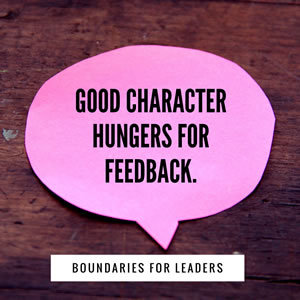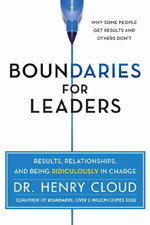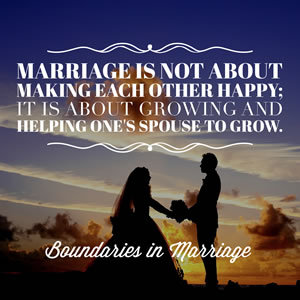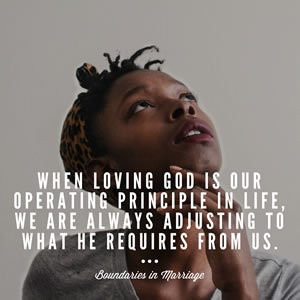Henry Cloud's Blog, page 17
August 23, 2016
Feedback Is the “Breakfast of Champions”
 Business management expert Ken Blanchard says that feedback is the “breakfast of champions.” Indeed, learning how we are doing and how to do better are keys to great performance. In fact, the best performance situations are when we are getting the most immediate feedback, which is from the task itself, as flow researcher Mihaly Csikszentmihalyi has found.
Business management expert Ken Blanchard says that feedback is the “breakfast of champions.” Indeed, learning how we are doing and how to do better are keys to great performance. In fact, the best performance situations are when we are getting the most immediate feedback, which is from the task itself, as flow researcher Mihaly Csikszentmihalyi has found.
The problem tends to occur at the moment when we actually get the feedback, either from other people or from the outcomes themselves. That is when our leadership character shows itself. While Blanchard gets it exactly right about the kind of breakfast we need, truth is that not everyone has the same appetite for breakfast. Some people wake up and really want it, while it makes others sick to their stomachs. Some are allergic to feedback. They set boundaries against constructive criticism.
Brain research shows that feedback can do funny things to us if we see it as a danger or a put-down. We go into the “moving away” or “moving against” mode of fight-or-flight. The brain gets biochemically goofy. That is why you see people get so defensive and go to great lengths to fight any feedback. But remember, fight-or-flight only comes when there is a perceived danger. Therein is the rub. If we see feedback as dangerous, we will bristle and fight it. But if we perceive feedback as an unexpected windfall, like winning the lottery, we will seek it out and be open to it, and sometimes even pay for it. That is what good character does… it hungers for feedback.
To be the best you can be, you must develop a hunger for feedback and see it as one of the best gifts you can get. It is part of being an open system and has incredible value not only to you but also to your people.
I was conducting a leadership offsite where the executive team members responsible for the agenda had asked me to try to maneuver the conversation toward a topic they all wanted to discuss but didn’t want to state explicitly on the agenda. After a lot of discussion about why I had to “maneuver” it that way instead of just intentionally designing it that way, the team confessed that their real goal was to sneak some tough feedback about the CEO onto the agenda – but in a way that would not throw him off or make him defensive. They feared that if the agenda were openly designed to give him feedback, it would never work. They hoped I would be able to “go there if the mood was right.” How sneaky, a lot of pressure, and not a lot of hope for success, I thought. I told them I understood their concerns but that I had a different plan to get the CEO into the right zone.
So at the beginning of the meeting, I explained the “physics of leadership” and the importance of the Second Law of Thermodynamics, mentioned above. I explained why it is important for senior leaders to be an open system and model receiving feedback well in organizations, and I emphasized that being open to feedback is a key indicator not only of leadership aptitude but also character. Good character welcomes feedback and foolish character fights it off.
I don’t know whether it was these comments of the mood – or whether the team had just misread the CEO – but when the time came for “saying things that are hard to say, but necessary for the good vision,” one of the members of the executive team had the courage to wade in. He told the CEO that there were some things that they needed from him that they were not getting, and that there were some things in his leadership style that was leaving the team and the organization with some gaps in performance. I watched and held my breath, waiting for the whole retreat to blow up before my eyes. (I love these moments, though. They can be some of the most powerful.)
The CEO listened as this tough feedback came at him in front of his whole team. And he did what the great leaders do: He received it, and he thanked them for it.
They looked stunned. But what was amazing was the discussion that followed. The CEO talking about his own passions, and the strengths and weaknesses that made him lead that way. His candor broke the logjam, and the team was able to come together and offer ways to help the CEO deal with his challenges. What made it happen was the CEO’s receptivity to hearing what his stakeholders had to say – his willingness to embrace it and make changes. And part of what made him receptive was hearing from me, an outsider, that it was more than ok – it was normal and even desirable – to hear and receive feedback. Now, four year later, the team still refers to that moment as “the retreat where we got honest.” It was the beginning of a shift in the entire culture, ignited by the CEO’s openness to feedback.
What is your appetite for feedback? Do you get defensive or receptive?
________
 Overcome your fear of feedback and learn why some people get results when others don’t. Get the must-read leadership book for individuals and organizations by Dr. Henry Cloud, Boundaries for Leaders.
Overcome your fear of feedback and learn why some people get results when others don’t. Get the must-read leadership book for individuals and organizations by Dr. Henry Cloud, Boundaries for Leaders.
Photo courtesy of Stuart Miles at FreeDigitalPhotos.net
The post Feedback Is the “Breakfast of Champions” appeared first on Boundaries Books.
August 12, 2016
The Disease of Self-Sufficiency
 My (John) three-year-old son, Benny, is now firmly ensconced in the “I can do it!” stage of life. The other day we were getting ready to go out to dinner, and everybody was ready but Benny. He’d gotten all ready except for his pesky Velcro-strapped tennis shoes. They just wouldn’t cooperate.
My (John) three-year-old son, Benny, is now firmly ensconced in the “I can do it!” stage of life. The other day we were getting ready to go out to dinner, and everybody was ready but Benny. He’d gotten all ready except for his pesky Velcro-strapped tennis shoes. They just wouldn’t cooperate.
Being the helpful father (actually, the hurried father), I bent down to fasten his shoes for him. He quickly pushed my hands away, protesting, “I’ll do it! I’ll do it!” And he meant it. So we negotiated. I put him in the car and let him put the shoes on while we were driving to the restaurant. It was win-win.
Now, Benny is in love with autonomy, task mastery, individuation, and a lot of other developmental aspects of his growth. He is working on self-sufficiency, especially in the functional, “doing” parts of life. But Benny’s self-sufficiency is a little different in the relational, “loving” areas of life. Instead of task mastery exhilaration (“Look, Ma! No hands!”), he is still dependent on attachment. He needs snuggles, holding, soothing, and comforting. He certainly disagrees a lot more, and he likes to spend more time away from his parents, but the need for connection is still there.
That need for attachment will keep changing over time, and eventually, if things work out, Benny will have enough of us inside him (literally, he’ll have “had enough of us”). Then he will get his emotional needs met by peers and finally, by his own family. But he’ll continue to grow in his functional self-sufficiency.
People who avoid relationships have problems not with functional self-sufficiency but with relational self-sufficiency. The problem with the relationally self-sufficient person is that he operates in his own relational world. He runs his emotional affairs like a one-man business. His emotional philosophy is the following:
I take care of my problems.
I don’t burden others with my problems.
I can handle my problems myself, thank you.
I’m fine, really.
No, really, I’m fine.
What’s wrong here? God doesn’t create us to be relationally self-sufficient. He loves us to need each other. Our needs teach us about love and keep us humble. True self-sufficiency is a product of the Fall.
If you’ve got the disease of self-sufficiency, you’ve probably had it a long time. And you’ve probably described it in positive terms like responsible, independent, and grown-up. Indeed, self-sufficiency has lots of advantages, because you get to avoid all the uncontrollable problems and risks that needy people can’t get away from. Here are a few examples:
You don’t have to experience your incompleteness, which is painful.
You don’t have to go to the trouble of finding people to love you.
You don’t have to show other people the hurting, imperfect parts of yourself.
You don’t have to look anyone in the eye and say, “I need you.”
You don’t have to risk asking others to comfort and support you.
You don’t have to humbly receive what they offer, in gratitude. And you don’t have to do it again and again and again.
No wonder giving up self-sufficiency is so difficult. Life seems to have many more problems when your needs start leaking out.
What to do? If your self-sufficiency is driving you away from relationship and into isolation, begin the process of confession. Confession is telling the truth, and the truth is, you need people. The reason people say confession is good for the soul is because it brings unloved parts of our character to places of love.
Find people that understand self-sufficiency. They’ll know you can’t “feel your need” for them. But they’ll help you state your isolation, talk about the reasons you’re disconnected, and discuss how hard it is to give up your independence. As you confess this problem to safe people, a wonderful miracle happens: over time, self-sufficiency melts and gives way to need. You are then reconciled not only to God and others, but also to yourself.
Let the love God has provided begin to melt the cold, hard ice of your self-sufficiency.
________
Taken from Safe People: How to Find Relationships That Are Good for You and Avoid Those That Aren’t by Dr. Henry Cloud and Dr. John Townsend. Learn more about this helpful book.
The post The Disease of Self-Sufficiency appeared first on Boundaries Books.
August 1, 2016
Where Are the Safe People?
 I (Henry) got an emergency call, and the office relayed to me that I had a suicidal client. I called Theresa on the phone. She was distraught.
I (Henry) got an emergency call, and the office relayed to me that I had a suicidal client. I called Theresa on the phone. She was distraught.
“Tell me what happened,” I said.
“It’s not going to work,” Theresa replied, sobbing.
“What isn’t going to work?”
“Telling other people about my problems,” she said. “I went to my fellowship group tonight and told them about the depression and the problems with Joey, and they really came down on me for being depressed and for all the other stuff that has been going on.”
“What did they say?”
“Well, they said that I shouldn’t feel that way and that if I was still having all those problems then I probably wasn’t walking with the Lord. I don’t know what to do anymore. I’ve tried all this ‘safe relationship’ stuff, sharing and all that, and now it doesn’t work.”
“What would you say if I told you that you still haven’t found safe relationships?” I asked.
“What do you mean?” Theresa asked. “They are all Christians and in my church.”
“Well, Christian doesn’t automatically mean ‘safe,’ ” I told her. “Safe is defined by helpful. It doesn’t sound like tonight was too helpful.”
“Well, how do you know a helpful relationship?” she asked.
“That’s a good question,” I said. “Let’s talk about that.”
I empathized with Theresa. She had discovered a real truth: the church is not a perfectly safe place. That sounds like it cannot be true, for if anywhere should be safe, the church should be. Every fiber in our being rejects the idea that the one place we think ought to be safe — the house of God — isn’t.
The church is not a totally safe place, and it does not consist of only safe people. As much as we would like for it to be totally safe, the truth is that the church has to be seen the way God describes it. We must, if we are going to have a biblical view of relationships and people, and live the way that God wants us to live, see the church as he describes it. Our faith must be able to square with the reality of life as we find it and with the reality that the Bible describes to us. Let’s look at those two realities.
Theresa was echoing the experience of many people. Anyone who has been in the church for very long has been hurt by people in the church. For in the body of Christ, we find some harsh realities: judgment, pride, self-centeredness, manipulation, abandonment, abuse, control, perfectionism, domination, and every kind of relational sin known to humankind. The walls of the church do not make it safe from sin. In fact, the church by definition is composed of sinners.
To further complicate matters, church by its very nature as a family of God activates our most primitive and dependent longings because we want a perfect family. God designed the church to be our second family, and often we take into the church the same longing for security and love that we take into our families of origin. And for some, as in their original family, the wish is not only disappointed — it can be crushed altogether. What are we to do with that reality?
The one difference is that, as adults entering into the family of God, we have choices about who we are going to trust and get close to. David said in Psalm 101:6 that we can pick the “ones who will minister to [us].” But we are not by nature so discerning. We come into the church feeling and wishing, “Take care of me. I need you. I shouldn’t have to first figure out who is safe and who is not. You should be good and trustworthy.” We feel the longing of Romans 8 that says that we long for and groan for our adoption. We want things to be right. And then they are not.
On the other hand, many of us have felt that the body of Christ has nurtured, loved, and taught us in ways that have radically healed us. Through the acceptance and love of other believers our character has changed, and we have slowly let go of the things that shackle us.
We also hear others testify to that reality. They were destroyed by their families, or the world, and they were saved and healed in their church. Someone — or a group — in the church reached out to them, and their lives were radically changed.
I (Henry) can testify to this. I had dreamed and planned my whole life to play professional golf, from the age of six until I was recruited by a nationally ranked college to play varsity golf. I was beginning to compete on higher and higher levels and doing quite well. I thought my dreams were being realized.
Then catastrophe hit. A tendon problem in my left hand snatched my budding career right out from under me. I could no longer even hold onto a golf club, and there was no cure. I was lost and devastated. The path that I had diligently worked towards for fifteen years, day and night, had hit a dead end. At the same time, I encountered some other significant losses in my life. Things were falling apart. I got seriously depressed.
At first I tried to work my way out of it. I had always been a “don’t ever give up” kind of person, especially in sports. I thought I could lick this problem in the same way, through sheer hard work and willpower. But I got more and more depressed, and nothing was filling the hole inside of me. The depression and lostness continued to build until I decided to drop out of everything to try to sort things out.
I first reached out to God, telling him that I did not even know if he existed, but that if he would show me that he did, I would do what he told me to do. After all, my way wasn’t working.
Less than an hour after I prayed that prayer in a little chapel at Southern Methodist University, my phone rang. A friend I hadn’t talked to in quite some time told me that he and some others were starting a Bible study and that for some strange reason, he thought that he would invite me to come. I told him I would, not quite believing what had just happened.
To make a long story short, the leader of that Bible study and his wife invited me to come live with them for a semester while I sorted things out. Their gift of themselves to me forever changed my life. Their love and teaching touched some very deep parts of me as they led me to the reality of a relationship with God. He had found me, and through the love and acceptance of his body, I was being healed.
So the church can be a healing place, a place where lives are transformed and where powerful love and healing can take place. The body of Christ is still God’s instrument for our healing and restoration (1 Peter 4:10; Ephesians 4:16). So, the question arises and rings in our needy hearts: Is the church safe, or is it dangerous? The answer is, “It is both.” Sometimes we are fortunate to find good relationships, and other times we run into disaster.
The sad thing is that our ideals for the church do not reflect biblical reality, either. We think that the Bible promises a church where we find only safe people. But the Bible says that the church is full of wolves as well as sheep. In the church, we will find both tremendous healing and potentially tremendous hurt. And if we are going to find healing and minimize hurt, we need to make sure that we see the church as God describes it to us. We need to operate according to biblical reality instead of our fantasized wishes, for biblical reality is the one that will fit the experience we find in the real world.
Our experience and the Bible affirm the same thing. The church is full of safe people, unsafe people, and hurtful lingerers. There is no perfect family short of heaven. But there is also no absolute hell full of demons either. And the Bible’s clear message is that we need to be discerning. We need to make informed choices, and we need to be careful. But we also need to avoid becoming pessimistic and learn to recognize the goodness that abounds within the family of God (Matt. 25:34 – 40). If we become skeptics and give in to our fears of bad outcomes, God says that we will lose the little that we have.
So, the long and the short of it is that we have to work to find safe people, using our wisdom, discernment, and character. We gain wisdom and discernment through knowledge and experience. But if our own character problems get in the way of using our knowledge and experience we will make poor choices. We need to make sure that we are facing the weaknesses inside and dealing with them, becoming people of character who can choose other people of character, with a knowledge of what they look like. As we get the log out of our own eye first, we will be able to see clearly.
________
Adapted from Safe People by Dr. Henry Cloud and Dr. John Townsend. Learn more about this helpful book.
The post Where Are the Safe People? appeared first on Boundaries Books.
July 19, 2016
How Confrontation Creates Connections for Couples
 When my wife, Barbi, and I (Dr. Townsend) were first married, we used to have conflicts about conflict. Looking back, it’s kind of funny as I later went on to write a Christian relationship book called Boundaries in Marriage. Imagine watching us have boundary conversations about how bad our marriage boundaries were. Barbi’s approach to conflict was to avoid it. My approach tended to be more blunt. We’d talk about a problem and it wouldn’t go well. One of us would misunderstand, we would pull away from each other, and the problem wouldn’t get solved.
When my wife, Barbi, and I (Dr. Townsend) were first married, we used to have conflicts about conflict. Looking back, it’s kind of funny as I later went on to write a Christian relationship book called Boundaries in Marriage. Imagine watching us have boundary conversations about how bad our marriage boundaries were. Barbi’s approach to conflict was to avoid it. My approach tended to be more blunt. We’d talk about a problem and it wouldn’t go well. One of us would misunderstand, we would pull away from each other, and the problem wouldn’t get solved.
One day, I asked Barbi, “When we argue, I never stop loving you. Is there anything I can do to make this better for you?” She thought a minute and said, “Maybe if you let me know you love me before you confront me, that might help.”
I thought that was a good idea, so I agreed. The next time I wanted to have a talk with her about a concern, I walked in the room and said something like, “Honey, I just want to let you know I really care about you and I hope you feel safe with me.” Then when I brought up the problem, things went better for her and for us.
This method of having successful conversations went on for a while. As time passed, however, something changed. I needed to bring up an issue, so I began with, “Honey, I just want you to know …” Barbi said, “Stop! It’s okay. I know you love me; just get to the problem.”
We had a good laugh about it. Over time, she had begun feeling safe enough not to need reassurance before each conversation. She realized that I love her even in the midst of confrontation, and she was ready to go straight to solving whatever problem needed to be solved.
When God created marriage, he gave us one of his best gifts. He provided a permanent and safe connection for a man and a woman to experience love, joy, meaning, and purpose together. Genesis 2:24 says, “For this reason a man will leave his father and mother and be united to his wife, and they will become one flesh.” God designed marriage to be a whole-person connection. This means that, more than in any other human relationship, every part of you ideally is to connect and cleave to every part of your spouse. The love you share should be complete as you intertwine your lives and emotions around each other.
Because marriage is such a wonderful type of relationship, confrontation within the marital relationship is very important. Who is better qualified to understand and speak to someone about a problem than the person who is living life right next to him? You are intimately involved with him. You see the real person, imperfections and all. His ways and actions affect you; you are not dispassionate about him. More than anyone, a spouse should be able to see what her partner’s true problems are.
Marriage is not about making each other happy; it is about growing and helping one’s spouse to grow. For instance, Ephesians 4:16 says good marriages are a large part of how the body of Christ “grows and builds itself up in love.” Happiness can and does come to a good marriage. Happiness, however, is a byproduct of growth and life. It is not the goal.
Confrontation brings empowerment, which is the ability to make choices and changes in your relationship. God created all of us to be change agents for each other. We have a responsibility to influence the people in our lives to be the best possible people they can be. For instance, 1 Thessalonians 5:11 says, “Therefore encourage one another and build each other up.”
Healthy confrontation helps us grow by making us aware of what we are doing and how our behavior affects others. God uses us to deliver the ingredients of growth to the people in our life. Part of the reason we are with whomever we are with is to provide those ingredients for those people. While most would agree that we can’t make someone change, it is also true that we can do much to encourage change.
As Barbi and I have learned to confront each other lovingly, directly, and effectively, we are often pleased in the change not only in our marriage but also in ourselves. We feel a sense of power that we can make changes and that we have choices. God designed all of us to connect and act, and confrontation helps put the “act” into the connection.
________
 If your marriage is struggling or you want to make a great marriage even better, Boundaries in Marriage has the answers. Learn how to:
If your marriage is struggling or you want to make a great marriage even better, Boundaries in Marriage has the answers. Learn how to:
Transform your relationship into a haven of mutual love, caring, and appreciation.
Protect your marriage from intruders, whether parents, affairs, or addictions.
Handle conflict effectively without losing your voice in the relationship.
Develop a sense of closeness and respect that you’ve never felt before.
Click here to read a sample chapter, watch a free video, and purchase your copy today.
The post How Confrontation Creates Connections for Couples appeared first on Boundaries Books.
July 17, 2016
Single Parent: 3 Tips to Save Your Sanity
 If you are a single parent, you may need to know something: you have the hardest job in the world. You have to meet all the needs of your kid, over many years, without the help of a spouse. Some of my (Dr. Townsend) closest friends are single parents, and my heart breaks with theirs when they encounter the rough years of parenting. Single parenting can sometimes be brutal and overwhelming. That’s why it’s important to discuss boundaries for single parents.
If you are a single parent, you may need to know something: you have the hardest job in the world. You have to meet all the needs of your kid, over many years, without the help of a spouse. Some of my (Dr. Townsend) closest friends are single parents, and my heart breaks with theirs when they encounter the rough years of parenting. Single parenting can sometimes be brutal and overwhelming. That’s why it’s important to discuss boundaries for single parents.
Many of my friends have also found the balance and resources they need, and they are experiencing success as parents. Their children and teens are doing well and are maturing at the right rate. So there is hope for you as well.
Let’s look at three of the biggest struggles single parents face and explore what you can do to meet those challenges:
Single Parent Challenge #1 – Not Enough of You
Single parents have to do the work of two parents, yet they have more limited resources than two-parent families, both in quantity and in ability. This limitation becomes more of a challenge when your kids are teenagers. They push against your authority and limits and assert their freedom in a million ways.
Parents who have a spouse can hand off their teen to the other parent when they are feeling worn out. My wife and I do this all the time. But you can’t do this as a single parent. If your teen doesn’t let up on you, you don’t get a chance to rest and regroup. This can be exhausting, and it’s easy to feel you don’t have any strength left inside to resist your kid’s resistance.
What can you do? The answer isn’t trying harder, or using your will power. Instead, realize that you don’t have what you don’t have. You will need to get from the outside what you don’t possess on the inside. You need to do this for your kid, and for yourself as well. Call a safe and sane friend and get your emotional tank filled, and then enter the ring again and resolve the issue.
It’s tempting for single parents to think, I am so tired. I just don’t have it in me to spend a lot of time talking with my kid. Besides, he’s almost an adult anyway, so he probably doesn’t even need a lot of me. While your teen is almost an adult, he still needs bonding time with you in order for him to feel safe and loved and to help him sort out the vagaries of teen life. So get some strength from others, so that you can stay attached to your teen.
Keep in mind that you may need to ask another adult, such as a mature friend, youth pastor, or counselor, to intervene. Your teen may be able to hear things from this other person that he refuses to hear from you. Regardless, get connected.
Single Parent Challenge #2 – Rescuing Your Kids From Failure
I recently asked a single mom who is a good friend of mine, “What do you think is the biggest mistake single parents make?” Without hesitating, she said, “Not allowing their kids to fail.”
My friend was talking about rescuing young kids and teens from experiencing their consequences. Parents who rescue their adolescents often do so out of guilt. They already feel bad about their kid’s situation, and often feel partially responsible that their child doesn’t have two parents in the home.
As a result, single parents often indulge their teen and don’t enforce the consequences that should come with attitude and behavior violations. They think, My teen already has a strike against her. I’ll make it up to her a little by being easy on her. However, this “solution” doesn’t solve the problem; it merely creates a second problem. Not only does the teen have to struggle with a broken home, it’s likely she will never develop any self-control. Kids from a single-parent family need limits just as much as any kid does.
Surround yourself with guilt-busters — that is, friends who will support you when your emotions tell you you’re being too mean. Cry on their shoulder, allow them to give you a reality check, and let them encourage you to love your teen and still hold the line.
I have a single-parent friend who always felt guilty whenever she grounded or took privileges away from her teens. But her kids have grown up, and they have come back to her and said, “Thanks for being strict, Mom. That’s why I can keep my own marriage and job together.”
Single Parent Challenge #3 – Parenting Differences With Your Ex
Many divorced parents differ in their parenting values. Often, a parent will notice that the child has a bad attitude or misbehaves after she has spent some time with the other parent. You can attribute some of that to the teen trying to adjust and transition between two worlds, and she needs your support and patience on that. But it may also be that your ex is not providing enough structure and consistent limits.
If this is your situation, do all you can to get your ex to agree to put your kid first and to come to an agreement on parenting values and styles. If your teen’s well-being is in jeopardy, you may even have to go the legal route for his protection.
If you see some negative effects when your teen spends time with your ex, but they aren’t serious enough for you to take legal action, then be the best parent you can be. Be balanced and integrated with love and boundaries. If your ex is a Disneyland parent, don’t be the hardnose, hoping to compensate. Your teen needs to be around someone whom she can take inside of herself, who is a picture of maturity, grace, and truth. Don’t try to get even with your ex. Get healthy.
Ask for Help
Finally, don’t try to be strong and go it alone. Ask for help from your kid’s school, your church, and your friends. Single parents need more help, and they should get more.
God has a special place for you and your children. In Psalm 68:5, King David wrote about how much God wants to provide for kids who don’t have both parents around: “A father to the fatherless, a defender of widows, is God in his holy dwelling.” Ask God for help, and He will give it to you.
________
 Recently, we received several requests for more information about boundaries for single parents. We wanted to honor those requests by sharing this excerpt from “Chapter 7 – For Single Parents” in Boundaries with Teens by Dr. John Townsend. In his book, you will find a lot more information for single parents, including a separate chapter dedicated to step-parenting.
Recently, we received several requests for more information about boundaries for single parents. We wanted to honor those requests by sharing this excerpt from “Chapter 7 – For Single Parents” in Boundaries with Teens by Dr. John Townsend. In his book, you will find a lot more information for single parents, including a separate chapter dedicated to step-parenting.
Click here to purchase your copy and get compassionate, insightful advice from Dr. Townsend. Boundaries make life better!
The post Single Parent: 3 Tips to Save Your Sanity appeared first on Boundaries Books.
July 11, 2016
Finding Hope for a Hopeless Marriage
 I (Dr. Cloud) was once meeting with a couple who had given up hope in their relationship. I knew that they were at the end of themselves. From their perspective, divorce was the next option. At the same time, I knew that their problems were curable. I felt that we first needed to put this couple’s hopelessness on the table, so I asked, “Do either of you have any hope for this marriage?”
I (Dr. Cloud) was once meeting with a couple who had given up hope in their relationship. I knew that they were at the end of themselves. From their perspective, divorce was the next option. At the same time, I knew that their problems were curable. I felt that we first needed to put this couple’s hopelessness on the table, so I asked, “Do either of you have any hope for this marriage?”
“No, we don’t,” they both finally admitted.
Then I said something that threw them: “Good! Now we can get to work.”
“What do you mean?” they asked, surprised.
What they did not know was that I knew they both had a deep love for God and, although they were ready and willing to forsake each other, they were not ready to forsake Him. I trusted their faith in God. I knew that if they could stop lying to themselves about wanting to change “for the other,” we could get to someone for whom they would change: God. So I told them so.
“I think that both of you are so disappointed in each other and in your relationship that you have very little hope of solving your problems for each other. In reality, there is not enough love between the two of you to hold you together. I’m glad you are facing that reality, because deep down you both know it. But I know something else about you. You both love God enough to make the changes that He wants you to make, and if you do that, I promise you that you will do very well in your relationship. Will you both commit to that kind of love? Can you both commit to doing what God is going to ask of you in this process?”
Both said that they could, but both were downhearted about it. They thought that I meant that just because God says He is against divorce, I was asking them to remain faithful to Him and just stick it out in a miserable relationship. In a sense, I was. But I knew better than that. I knew that if they could submit to the changes God would ask them to make, the marriage would get better. But since they could not believe that, they had to take it on faith.
Jesus said that the greatest commandment is to love God “with all your heart and with all your soul and with all your mind and with all your strength” (see Mark 12:30). Why did He place this value above all others?
Although we could point to many reasons, one in particular relates to marriage. When loving God is our orienting principle in life, we are always adjusting to what He requires from us. When things get tough in a marriage and when some change is required from us, we might not want to do it. We might feel that it is unfair that we have to change, or it might be too difficult or painful to change. At those moments, it is much easier to just please ourselves. But if we know that it’s God with whom we ultimately have to deal, we submit to this reality and His higher calling to us to grow. In the end, the relationship wins.
The “hope-less” couple and I worked hard for a while. And they learned something. She learned that at times she would want to be judgmental of her husband but God said no. She would be very angry toward her husband, but she would submit to God and give up her judgmentalism.
At times, the husband would get so angry toward his wife that he would want to snap back with sarcasm, something he was very skilled at. But he knew that someone higher was asking him to deny himself that little treat. He would submit to God and bite his tongue.
At other times, he wanted to give in to the temptation to avoid listening to her complaints about him. He hated conflict. But he learned that God wanted him to listen and not react defensively. He would submit to God and remain in the conflict long enough to work it out. Before, he would turn to his hobbies and avoid her.
She learned as well that she had a lot of bitterness and fears in her own life for which she was blaming her husband. She found out that God wanted her to take responsibility for feelings with which she had never dealt, so she submitted to God and did the work of change. She got healthier.
Just recently, about a year after the hopeless conversation mentioned above, we had an interesting session. This couple did not have anything to work on. They were doing so well they had nothing to talk about!
She was a little giddy, reminding me of a teenager. “We are just having so much fun together! It is everything that I married him for in the beginning. I never thought we would be here.”
“I can’t believe what I was missing,” he joined in. “I just love being with her. None of that other stuff—mostly work—that I used to spend all of my energy on matters very much any more. I just want to be with her and talk.”
Then we reflected on where they had been a year earlier, when it had all seemed so hopeless.
“I did not know what to do,” one of them said, “so we just trusted you when you said there was a way out. And it worked.” I clarified something for them. “It may have seemed to you that you were trusting me. But in reality you weren’t. I was telling you that I knew that God’s ways worked and that, if you could do them, your relationship would work. You made that commitment to God, and both of you followed through with the day-to-day work that He asked you to do. When God asked you to grow and change, you submitted to Him. And now you have the fruit that God promises. You might have thought that you were trusting me, but I was just representing Him. When you committed to follow Him and whatever He showed you, I knew that you would make it.”
It was a neat moment. I have no doubt that they will make it now for the rest of their lives. They now have a real love between the two of them that they did not have before. But it came as a result of “loving God.” They loved God enough to do what He asked of them, and they grew to love each other as a result. The love that they now have for each other is a fruit of loving God.
This is why loving God must be first. He empowers us to change. He tells us how to change. Most of all, God becomes the one that keeps us from being ultimately in charge. If we try to be in charge, we will do it our way, and then our own limitations become the limitations of the relationship as well. We all need someone bigger to answer to so we will make the changes we need to make. Love God first, with all of your heart, mind, soul, and strength. Lose your life to Him, and you will gain it.
________
 If your marriage is struggling or you want to make a great marriage even better, Boundaries in Marriage has the answers. Learn how to:
If your marriage is struggling or you want to make a great marriage even better, Boundaries in Marriage has the answers. Learn how to:
Transform your relationship into a haven of mutual love, caring, and appreciation.
Protect your marriage from intruders, whether parents, affairs, or addictions.
Handle conflict effectively without losing your voice in the relationship.
Develop a sense of closeness and respect that you’ve never felt before.
Click here to read a sample chapter, watch a free video, and purchase your copy today.
The post Finding Hope for a Hopeless Marriage appeared first on Boundaries Books.
July 5, 2016
Nice Guys Don’t Finish Last
 I (Dr. Cloud) had a very interesting conversation recently with a leader who accomplishes a lot and is very driven and effective. I have always been a fan of his work. We were working on a project together, and he made a reference to a particular work habit of his, logging almost every thought he has about his work into a very complicated matrix in a journal, and I asked him about it. Nothing wrong with carrying a little book around and jotting down good ideas when they come. But this was much more; it was obsessive. He said, “I think it’s probably part of my anxiety disorder.”
I (Dr. Cloud) had a very interesting conversation recently with a leader who accomplishes a lot and is very driven and effective. I have always been a fan of his work. We were working on a project together, and he made a reference to a particular work habit of his, logging almost every thought he has about his work into a very complicated matrix in a journal, and I asked him about it. Nothing wrong with carrying a little book around and jotting down good ideas when they come. But this was much more; it was obsessive. He said, “I think it’s probably part of my anxiety disorder.”
I inquired more, and he told me that he had been managing a significant anxiety disorder for some time and had relied on a number of tricks and habits to keep it in check. As I listened, I couldn’t help being moved by how much effort it must cost and how distressing it must be for him to manage this condition. I also couldn’t help wondering how much better his life and work could be if he didn’t have to do all that. The psychologist in me had to speak up.
“So, . . . I’m just curious. You know, what you’re experiencing is treatable. Anxiety disorders are pretty fixable. You don’t have to suffer with this—really,” I said. “Why don’t you get some help for this?”
“I would,” he said, “but I am afraid to.”
“Afraid of what?” I asked.
“Afraid that I wouldn’t be as effective,” he said. “I’ve always thought that the anxiety I have about something possibly going wrong or not working is what makes me so good at what I do. I always make sure, and double make sure, everything is covered and nothing can possibly go wrong. I feel like if I weren’t anxious, I would miss a lot of things and there wouldn’t be the same results.”
“Wow!” I said. “I wonder how people without anxiety disorders ever accomplish anything.” I was joking—sort of, but not really. But he didn’t quite get it.
“I don’t know,” he said. “I’d fear that I couldn’t perform at the same level if I didn’t have the anxiety.”
Incredible, I thought. Still, I’ve heard some version of this explanation many times before and in many different kinds of situations. For example, often when I give a talk about how leadership, character, emotional intelligence, and relational issues affect results, I invariably get a question like this: “You are saying that all of this relational ability is important for leadership and getting results, and being successful. But what about someone like Steve Jobs? He was very successful and known to be difficult to work with in some of these ways. How do you explain that? It seems like it’s the hard-driving, dominating behavior that gets some people where they are. It’s always the jerks that are most successful.”
Or consider an e-mail I recently received from a well-known national news commentator who in her reporting continues to run into powerful and successful people who are “not good guys,” as she put it. She’d sent me a link to an article concluding that “mean” people and “jerks” tend to be more successful than the “nice guys” in all areas of business, entertainment, and other fields. Her comment about the article was this: “This is depressing. Do you agree with this? I am starting to believe it, based on my experience.”
Both of these examples underscore the same false assumption: the myth that something dysfunctional is contributing to success. You’ve heard it too with comments like this: “He’s such a jerk, but I guess that’s how he got to where he is.” Or even: “If I were more of a shrew at work, I probably would be running this company.”
Trust me. Neither statement is true. Being a jerk, or a narcissist, or having an anxiety disorder that drives one to double-check everything—these are not the personality traits that make for great success. Remember, there are also an awful lot of unsuccessful jerks, narcissists, screamers, and people with anxiety disorders. And there are a lot of very effective, successful people who have none of those maladies.
The truth is that Steve Jobs was successful because of incredible talent, brains, vision, marketing abilities, design strengths, charm, and initiative. He was assertive, he had amazing reservoirs of creative energy, and he didn’t hesitate to push people to their limits and beyond. These are all positive attributes that made him successful.
The jerk behavior just got in the way, unless you think getting fired, losing key people and relationships, and creating sometimes toxic environments are the recipe for an iPhone. It was not the oppressive, domineering behavior that made it all work. Apple worked in spite of it and probably could have been even more outstanding without it. What if he had never gotten fired? What might the company have done if he’d been less difficult?
Mark these words: Nice guys do not finish last, and jerks do not finish first. Great performers finish first, and if they are great and good people, they do even better.
As research confirms, the qualities that lead to great performance are only enhanced in great relationships. The opposite is also true: great performance qualities are either limited or reduced by dysfunctional relationships. On page 5 of Working Together: Why Great Partnerships Succeed (HarperCollins, 2010), former Disney CEO Michael Eisner reminisced about his longtime business partner:
“We were headed into the toughest challenge of our professional lives, together. For the next ten years, that journey would be as exciting, enjoyable, rewarding, and triumphant as either of us could have dared to hope. From our first day in the office that fall, my partnership with Frank Wells taught me what it was like to work with somebody who not only protected the organization but protected me, advised me, supported me, and did it all completely selflessly. I’d like to think I did the same for Frank, as well as the company. We grew together, learned together, and discovered together how to turn what was in retrospect a small business into indeed a very big business. We learned that one plus one adds up to a lot more than two. We learned just how rewarding working together can be.”
I love those words: protected, advised, supported, selfless, grew, learn, discover, rewarding. Your life, performance, health, well-being, and pretty much everything you value depends on the power that the other brings to the table. This is serious stuff. It’s not for jerks.
________
Taken from The Power of the Other by Dr. Henry Cloud. Learn more about Dr. Cloud’s newest bestseller!
The post Nice Guys Don’t Finish Last appeared first on Boundaries Books.
June 25, 2016
How to Nip Relationship Problems in the Bud
 “I don’t understand what happened,” Todd told me (Dr. Cloud). “It seemed that Mary and I were doing so well, and then she just came in one day and told me that she didn’t want to be with me anymore. She was very angry about a lot of things.”
“I don’t understand what happened,” Todd told me (Dr. Cloud). “It seemed that Mary and I were doing so well, and then she just came in one day and told me that she didn’t want to be with me anymore. She was very angry about a lot of things.”
“Did you have any warning?” I asked. “Did she give any signs?”
“Well, sometimes I could tell that she was sort of pouty about things. There would be things I did that she would not like, but I never thought it was a big deal. Like when I would be late, or go out with my friends without telling her. Or, sometimes, I would cancel on her to go play basketball if a good game came up. That kind of thing. But I never thought it was a big deal,” he mused.
“Sounds like it was a bigger deal than you saw,” I said.
Then I heard Mary’s side of things. It was a little different to be sure. “I got to a place where I just couldn’t stand it anymore. He was so inconsiderate,” she began. “He would just not show up for things we had planned. I asked him to let me know, but he never would. He would always have a reason like ‘The game just got put together,’ or something like that. It was never his fault, but he chose his sports over me.”
“Did you tell him?” I asked.
“I tried a few times, but he really wasn’t listening. And, it never made a difference in his behavior. He just would do pretty much what he wanted to do, and I was supposed to be fine with it.”
“Did you ever try to give him any kind of boundaries?” I asked. “Like what?” she asked me in return.“ “Like tell him that if he were not on time or did not keep the date, he could forget getting together that night, or that week. You would make some plans that you could depend on,” I asked.
“That seems really mean,” she said. “I could never do anything like that. It is too harsh.” I did not tell her that it seemed a lot less harsh than a sudden breakup without any warning.
The issue in Mary and Todd’s relationship is a common one. There is a person in the relationship who is probably not that bad a person. But, he (Todd in this case) or she has been allowed to get away with taking advantage of other people’s niceness and not being responsible to the relationship. Usually, there is a pattern of inconsiderateness.
In dating, this can be the inconsiderate behavior that Mary dealt with. Or, it can be physical pressure, or attitudes, or any other way that one person hurts another short of something evil.
The formula that Mary did not know is this. In relationships, you get what you tolerate. Why, we are not sure. In part it is because people who allow people to get away with things seem to attract the kind that would want to get away with less-than-considerate behavior. Another reason seems to be that whenever we do not have good limits with each other, there is a regression on the part of the person who is enabled to be less than mature.
In any case, you can bet that for the most part, especially in the world of dating, you will get what you tolerate. And, if you are like Mary, you will get enough of it that you cannot tolerate anymore, and then you will be alone again.
We think that there is a better way. Set your limits early on. Make them clear. Enforce them and stick to them. In short, nip it—whatever the problem is—in the bud, and do not allow that weed to grow in the garden of your relationship.
If you are someone who allows yourself to be treated in a certain way in the beginning of a relationship, you are allowing certain things to get a foothold in the relationship and they will grow. There are two dangers to this. One, if the person is someone you will grow to love, you don’t want those dynamics present in the relationship at all. Second, if the person is not someone you will love, then you want to have them run into those limits and go away sooner rather than later. It is always better to “nip it in the bud.”
Set the tone early in how you expect to be treated, so that the person knows that he or she is dealing with someone who has self-respect and will not tolerate being treated poorly. This will weed out selfish people, and discipline sloppy ones. Both are good things to do.
________
 Get more helpful advice to build the best dating relationship and find the love of your life in Boundaries in Dating by Dr. Henry Cloud and Dr. John Townsend.
Get more helpful advice to build the best dating relationship and find the love of your life in Boundaries in Dating by Dr. Henry Cloud and Dr. John Townsend.
The post How to Nip Relationship Problems in the Bud appeared first on Boundaries Books.
June 20, 2016
Is Complying Out of Fear the Same as Lying?
 Many Christians fear that setting and keeping limits signals rebellion or disobedience. In religious circles you’ll often hear statements such as, “Your unwillingness to go along with our program shows an unresponsive heart.” Because of this myth, countless individuals remain trapped in endless activities of no genuine spiritual and emotional value.
Many Christians fear that setting and keeping limits signals rebellion or disobedience. In religious circles you’ll often hear statements such as, “Your unwillingness to go along with our program shows an unresponsive heart.” Because of this myth, countless individuals remain trapped in endless activities of no genuine spiritual and emotional value.
The truth is life-changing: a lack of boundaries is often a sign of disobedience. People who have shaky limits are often compliant on the outside, but rebellious and resentful on the inside. They would like to be able to say no, but are afraid. So they cover their fear with a half-hearted yes.
Take Barry for example. He had almost made it to his car after church when Ken caught up with him. Here goes, Barry thought. Maybe I can still get out of this one.
“Barry!” Ken boomed. “Glad I caught you!” The singles class officer in charge of Bible studies, Ken was a dedicated recruiter to the studies he presided over; however, he was often insensitive to the fact that not everyone wanted to attend his meetings. “So which study can I put you down for, Barry? The one on prophecy, evangelism, or the book of Mark?”
Barry thought desperately to himself. I could say, “None of the above interest me. Don’t call me—I’ll call you.” But Ken is a ranking officer in the singles class. He could jeopardize my relationships with others in the group. I wonder which class will be the shortest?
“How about the one on prophecy?” Barry guessed. He was wrong.
“Great! We’ll be studying end times for the next 18 months! See you Monday.” Ken walked off triumphantly.
Let’s take a look at what just happened. Barry avoided saying no to Ken. At first glance, it looks like he made a choice for obedience. He committed himself to a Bible study. That’s a good thing, right? Absolutely.
But take a second look. What were Barry’s motives for not saying no to Ken? What were the thoughts and attitudes of his heart? Fear. Barry was afraid of Ken’s political clout in the singles group. He feared that he would lose other relationships if he disappointed Ken.
Why is this important? Because it illustrates a biblical principle: an internal no nullifies an external yes.
God is more concerned with our hearts than he is with our outward compliance. “For I desire mercy, not sacrifice, and acknowledgment of God rather than burnt offerings” (Hosea 6:6).
In other words, if we say yes to God or anyone else when we really mean no, we move into a position of compliance. And that is the same as lying. Our lips say yes, but our hearts (and often our half-hearted actions) say no. Do you really think Barry will finish out his 18 months with Ken’s Bible study? The odds are that some priority will arise to sabotage Barry’s commitment, and he’ll leave — but without telling Ken the real reason why.
Here’s a good way to look at this myth that boundaries are a sign of disobedience: If we can’t say no, we can’t say yes. Why is this? It has to do with our motivation to obey, to love, or to be responsible. We must always say yes out of a heart of love. When our motive is fear, we love not.
The Bible tells us how to be obedient in 2 Corinthians 9:7, “Each of you must give as you have made up your mind, not reluctantly or under compulsion, for God loves a cheerful giver.”
Look at the first two ways of giving: “reluctantly” and “under compulsion.” They both involve fear—either of a real person or a guilty conscience. These motives can’t exist side by side with love, because “There is no fear in love; but perfect love casts our fear” (1 John 4:18). Each of us must give as we have made up our minds. When we are afraid to say no, our yes is compromised.
God has no interest in our obeying out of fear because, “Fear has to do with punishment. The one who fears is not made perfect in love” (1 John 4:18). God wants a response of love.
Are boundaries a sign of disobedience? They can be. We can say no to good things for wrong reasons. But having a “no” helps us to clarify, to be honest, to tell the truth about our motives; then we can allow God to work in us. This process cannot be accomplished in a fearful heart.
________
 Is it possible to set limits and still be a loving person? Absolutely! You don’t have to be controlled by fear or guilt. Read the New York Times bestselling book, Boundaries, and learn when to say yes and how to say no in a way. Drs. Henry Cloud and John Townsend provide practical, biblically-based solutions that help enhance all of your relationships.
Is it possible to set limits and still be a loving person? Absolutely! You don’t have to be controlled by fear or guilt. Read the New York Times bestselling book, Boundaries, and learn when to say yes and how to say no in a way. Drs. Henry Cloud and John Townsend provide practical, biblically-based solutions that help enhance all of your relationships.
The post Is Complying Out of Fear the Same as Lying? appeared first on Boundaries Books.
June 15, 2016
The Secret Ingredients to Stellar Performance
 Jack Nicklaus is the greatest golfer the world has ever known. His record of major wins is unsurpassed, even years after his last victory. Winning eighteen major tournaments is a record that is likely to stand for a long time. For those of you who are not golfers, that is the equivalent of more Super Bowls, World Series, heavyweight championships, tennis Grand Slams, or any other sports crown won by a single person or team. If you’re not a sports person, just call it the Oscars and think Katharine Hepburn.
Jack Nicklaus is the greatest golfer the world has ever known. His record of major wins is unsurpassed, even years after his last victory. Winning eighteen major tournaments is a record that is likely to stand for a long time. For those of you who are not golfers, that is the equivalent of more Super Bowls, World Series, heavyweight championships, tennis Grand Slams, or any other sports crown won by a single person or team. If you’re not a sports person, just call it the Oscars and think Katharine Hepburn.
Of all of his feats, one stands out to me (Dr. Henry Cloud). It was in the 1972 U.S. Open at Pebble Beach. On the seventeenth hole, he faced what he described as a howling wind, a 218-yard shot, and a three-stroke lead, which on a hole like that could quickly disappear. What happened? He hit the shot. The ball hit the flagstick and fell a few inches from the hole. Birdie! And a locked-up U.S. Open victory. (Google it. You will watch it several times.)
In a career spanning so many years and so many victories, why does that one shot stand out to me above all others?
Here’s the rest of the story.
Nicklaus has described what happened in that historic moment. Right at the beginning of his backswing, the wind howls and forces his swing somewhat off-line. He can feel that it’s not right. So what does he do? He adjusts his swing plane midswing, right in the middle of one of the most important shots in the U.S. Open. Hitting a 1-iron, an impossible club anyway, in a gusty ocean wind, on a monster of a hole, under all that pressure, he has total awareness of a moving golf swing, the effect of the wind on his angles, and he makes an adjustment. Remember: his golf swing would move the clubhead somewhere around 120 miles per hour. And still he’s able to adjust midswing and hit the shot, and it stops three inches from the cup, 218 yards away. That is self-control to a degree that I just have no words to describe in strong enough terms, from sports to neuroscience to magic. It’s just who he was. It came from his character and makeup.
His sense of self-control, ownership, and responsibility were even more evident when he lost. In recent years, looking back, when asked about his greatest shot, he didn’t mention that shot or any one shot, but a sequence of holes in 1966 at the British Open. He was standing on the sixteenth tee, he recounted, and said to himself, “OK, Jack, I want a 3–4–4 finish and I think you’ll win the Open if you do that.” And he did. He finished 3–4–4 and won. How’s that for total self-direction, control, execution, and ownership?
A few years later, he stood in the exact same place, right among the leaders, and said it again: “OK, Jack, 3–4–4 and you’ll win the championship again.” Unfortunately, he didn’t make the shot that time around, and here is the kicker … the main point: as he looked back on that loss, he commented, “I finished 4–5–4 and lost by a shot. So I had my own destiny in my hands … and I just didn’t do it” [emphasis added]. That statement reveals the secret of his greatness. He saw himself as being in control, win or lose.
Listen to the ownership, the total realization of who is in control of Jack and his performance: Jack. He doesn’t offer excuses, such as, “It was windy that day and a gust of wind carried the ball too far on seventeen.” Or, “Someone yelled in my backswing.” There’s no “the dog ate my homework.” Instead, we hear total ownership: “I just didn’t do it.”
I have never seen great performers who felt themselves to be out of control of their own performance, emotions, direction, purpose, decisions, beliefs, choices, or any other human faculties. They don’t blame others or external factors. The greats are not like lesser performers, who try to explain away their failure as being somehow caused, forced, or controlled by someone else.
Self-control is a big deal in human performance. Getting better depends upon it. You cannot get better if it’s not you who has to get better. You are the performer, period. You are the only thing you can control.
In the psychological world, this idea and description of health is called by many names. “Self-efficacy,” “agency,” and “locus of control” are a few. It is the “perception that one is in control of oneself.” If you have a 1-iron in your hand to win the U.S. Open, it’s good to realize that it’s in your hand, not someone else’s. If you do know it’s in your own hand, your mind and body (two parts of Siegel’s performance triangle) can adjust it to hit one of the greatest shots in history and win a U.S. Open. If you don’t, you’ll just continue the swing and then look up to see where it went. Good luck. A lot of people’s days and even lives are like that. They look up to “see where it went.” The greats in business, sports, or life know that they and only they hold the club. (See my book Boundaries for Leaders, HarperCollins, 2013.) And, remembering Siegel’s mind as regulator, you can see how a mind that has that kind of self-control can lead to very high performance.
Whether as a business leader, an individual performer, a parent, a spouse, or even as a patient in the health care system, once you realize that—that the 1-iron is in your hand—you are on your way to breaking through to the next level. You are 100 percent in control of your side of the relationship, your levers in the business, your input, the training and discipline of your kids, and on and on. Self-efficacy is part and parcel of any kind of human performance. Obviously you are not in control of the universe or other people, but you are always in control of yourself.
But The Power of the Other (from which this post is taken) is not a book about self-control. In fact, this isn’t even a book just about self. It’s a book about the power of the other—the power that someone else, not you, has in your life of performance, achievement, and well-being. Seems like a contradiction, right? On the one hand, I’m saying you’re totally in control of your performance, but on the other, I’m telling you that other people have power over your performance too. Which is it? Self-control or the power of others? Anyone confused?
The answer is yes. We all are confused. The reason we’re confused is that we see self-control and our individual performance as totally dependent upon ourselves and what we do, which is right, and as having nothing to do with anyone else, which is wrong. The truth is that, while our self-control and performance is totally in our control, it derives much of its sustenance from the power of our formative relationships. Yes, others, in the past and the present, help build our capacity for self-control. That is the paradox of performance.
Said another way, how much you perceive yourself as being in control of your life depends in part on how much the most significant people in your life support that ability and simultaneously hold you responsible for it. Winners not only perceive themselves as being in control of themselves and their choices, but also they exercise this control every day, and we can see it. They have that incredible sense of ownership, but in part it was built and is sustained by relationship.
________
Taken from The Power of the Other by Dr. Henry Cloud. Learn more about Dr. Cloud’s newest bestseller!
The post The Secret Ingredients to Stellar Performance appeared first on Boundaries Books.



